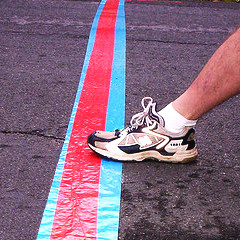The apostle Paul compares our life in Christ to a footrace. Like any race this is one that only the diligent will win.
Go back to your childhood story time. Though he had every advantage, Aesop’s hare lost to the tortoise because he dawdled and frittered. We face the same temptations, but Paul exhorts us to run with intensity: Run like you want to win.
Says the apostle, “Do you not know that those who run in a race all run, but one receives the prize?” This isn’t to say that only one will be saved. But Paul is saying we should run like it. “Run in such a way that you may obtain it,” he says (1 Cor 9.24). Run like it matters, like you want that singular prize.
So how do we do it? Thankfully, Paul provides a guide.
Training to win
“Every athlete exercises self-control in all things,” says Paul. “I do not run aimlessly, I do not box as one beating the air; but I pommel my body and subdue it. . .” (1 Cor 9.25-27).
The intensity of the runner is measured by the mastery of self, something that takes on special meaning in lent. Don’t forget: For all of its spiritual meaning, the word asceticism originally implied athletic training.
And let’s not kid ourselves. Training is what we need. How much power do our appetites, passions, and distractions exercise in our lives? This race of ours is an obstacle course, seemingly designed to bring out the worst in us at times. Just tally five things that fell in your path this week: a challenging family situation, disappointment on the job, an argument with a friend, opportunity for jealousy, lust, anger, scorn — feel free fill in your personal besetting sin.
Stay the course
Regardless of what we face, intensity is about overcoming. If we lose ground, Paul would have us regain our stride and keep going. If we get into the weeds, he urges us to find the track again. Paul models this for us as well. He endured beatings, stonings, prison, shipwreck, mob threats, poisonous snakes, the vague-but-torturous thorn in his side, and finally his own martyrdom.
Our struggles may seem to pale in comparison, but they are real nonetheless. Life-and-death real. Paul exhorts us to run the race to win the prize — to stay the course no matter what frustrates and hurts us, no matter how often we stumble or hit the wall.
And we can. The same Jesus who empowered Paul empowers us.
Do what the coach says
Life in Christ comes with a training regimen: participation in worship, sacraments, prayer, fasting, almsgiving, vocation, and other good works prepared in advance by God for us to do (Eph 2.10).
Are we following our interests or the Lord’s regimen? That’s what Paul wants us to ask ourselves. Are we subduing our bodies and our bodies’ desires or letting them dictate our course, reacting to hardships with resentment instead of gratitude, choosing momentary pleasure instead of constant faithfulness?
Earthly competitors follow the counsel of their trainers, and they do it for an earthly, perishable crown. Paul is pushing us to follow the counsel of our trainer, Christ, and do so for an imperishable crown.
How have you been running so far this week? What could you do now to finish better?
Side note: No pain, no gain
Jane Fonda popularized the phrase “no pain, no gain” in her exercise videos of the 1980s. But we all know Fonda nicked it from Ben Franklin’s Poor Richard. “There are no Gains without Pains,” runs just one of a thousand aphorisms in Franklin’s 1758 essay, “The Way to Wealth.”
But Ben took it from seventeenth century poet Robert Herrick: “If little labour, little are our gains / Man’s fortunes are according to his pains” (Hesperides 752). Did Herrick filch it from even further back?
This is from Ignatius’ letter to Polycarp, written around the turn of the first century: “Where there is more toil, there is great gain” (1.1, Loeb edition). Other translations give it this way: “where the labour is great, the gain is all the more.”
It’s interesting that while Ignatius’ point was spiritual, his toil-and-gain notion extends from a sports analogy. Just before he mentions it, he invokes the idea of “a perfect athlete.” Jane would have been happy. And so would the Apostle Paul. Ignatius is just carrying the baton Paul passed to him — and he’s passing it to us.












